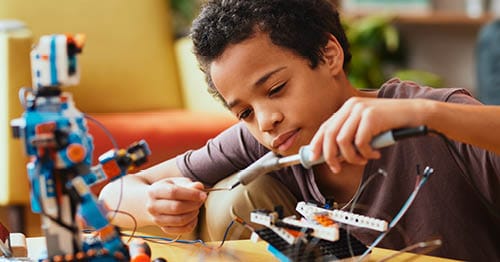Setting Healthy Screen Time Limits for Students Learning Online
by Julie Hersum
by Valerie Kirk
6 min to readThere are no two words more universally despised by parents and caregivers than “I’m bored!”
As parents, we often feel responsible or obligated to fill our children’s time. But the time we spend filling their days so they don’t feel bored can often lead to parent burnout. It is also depriving our kids of learning a critical life skill–how to be bored.
Boredom is a normal feeling and usually occurs when we don’t have anything we find stimulating to occupy our time or our mind. For adults, we have resources and experience to overcome our feelings of boredom and can usually find something to do that is productive and brings us joy.
Kids haven’t always learned how to do that yet. Kids may say they are bored because they are hungry or want attention. But primarily, kids who are growing up today likely live in an overstimulated world where they go from school to activities and then jump on devices where they are fed cartoons, video games, and social media feeds. Their brains are constantly being stimulated by things being pushed to them. When faced with downtime, they don’t always have the critical-thinking skills to know how to come up with something to do on their own.

Kids are naturally curious and creative. Constantly planning activities may actually deprive them of feeding their curiosity and creativity naturally. Having time to become bored can inspire them to explore the world around them and discover who they are as individuals.
So, is it good to be bored? Yes! Scheduling unstructured time into your child’s day is good for their growth and development. It can also make them better students, as boredom helps their brain recover from the hard work they are doing in school.
While we hate to hear the dreaded “I’m bored,” here are six benefits of boredom to help you step back and let your child be bored.
Kids are typically told what to do during structured activities; there is a plan that they have to follow. During unstructured time, kids can choose their own activities, which often sparks creativity. They could come up with their own play or draw a picture. They could use building toys to design a new structure.
Sometimes the best ideas come to us when we have the downtime to think through things creatively. Entrepreneurs, inventors, innovators, artists, and many other professionals rely on creativity to be successful in their careers. Helping children discover how they can tap into their own creativity can help them throughout their life.
Boredom helps children develop planning strategies, problem-solving skills, and organizational skills because they are planning and doing activities on their own, without the steps being mapped out for them. If they encounter a roadblock, they have to figure out how to overcome it. These skills can be lacking in kids whose lives are highly-structured.
Giving children the opportunity to come up with something to do and to plan it from start to finish on their own develops the soft skills that will help them be successful throughout their school years and their careers.
Kids who are bored may decide to try something new to keep their minds stimulated, such as planting a small garden, learning how to make brownies, or learning how to crochet. When faced with downtime, kids can be pretty resourceful if they have the freedom to daydream and imagine themselves doing new things.
Building, creating, or planning something on their own is a great confidence booster for kids, and can help build their self-esteem. Once they realize what they are truly capable of, there are no limits to what they feel they can accomplish.
Nobody succeeds the first time they try something new–and that’s okay! Pitfalls are part of life. We usually try to shield our children from failing, but kids who are resilient know how to overcome and move on from failure. If something they decide to do while they are bored doesn’t happen the way they envision, they can learn from that experience and do things differently the next time.
Before scheduled activities and electronics, kids were typically sent outside to play. While it is a different world today, there are tremendous benefits to kids for getting outdoors, especially when they are bored.
If there is a park or playground nearby, bring a ball and have your kids play there. They could meet new friends. The best part about meeting kids when they are bored instead of in structured activities is that the play becomes child-led instead of parent-directed. Kids have to learn teamwork, negotiation skills, and other social skills that will help them throughout their lives.

Being bored can be really hard on kids who just can’t find ways to amuse themselves. That certainly leads to frustration because we hear the dreaded “I’m bored” words repeated over and over again.
You can avoid this by proactively working with your child to build a “What to do When You’re Bored for Kids” boredom activity list. Working together, brainstorm things they can do when they are bored. This should include both short-term activities, such as reading a book or drawing a picture and long-term projects that they can work on in short bursts, like tending a garden or doing a hard puzzle. The Connections Academy Resource Hub has several articles on activities that students can do on their own, including DIY science experiments.
When your child says they are bored, pull out the list and have them pick something to do, then send them on their way.
Keep boredom-buster toys within easy reach. These include things like building toys. If you find your child building the same structure over and over again, ask them to design and build something new. When my kids complain that they are bored, I ask them to design a structure that uses a certain number of colored blocks and shapes to get them to think creatively. It’s always fun to see how the same direction leads to vastly different structures.
Books and kid-friendly craft supplies are also great boredom busters. Keep a bin of outdoor toys within reach too. Make sure their bikes are in good working order if they are old enough to ride their bikes on their own through the neighborhood.
While it is easy to hand over the electronic devices when your kid starts complaining about being bored, giving them a little nudge to help them figure out what to do on their own when they are bored could help them develop critical skills they need for a successful and happy life.
